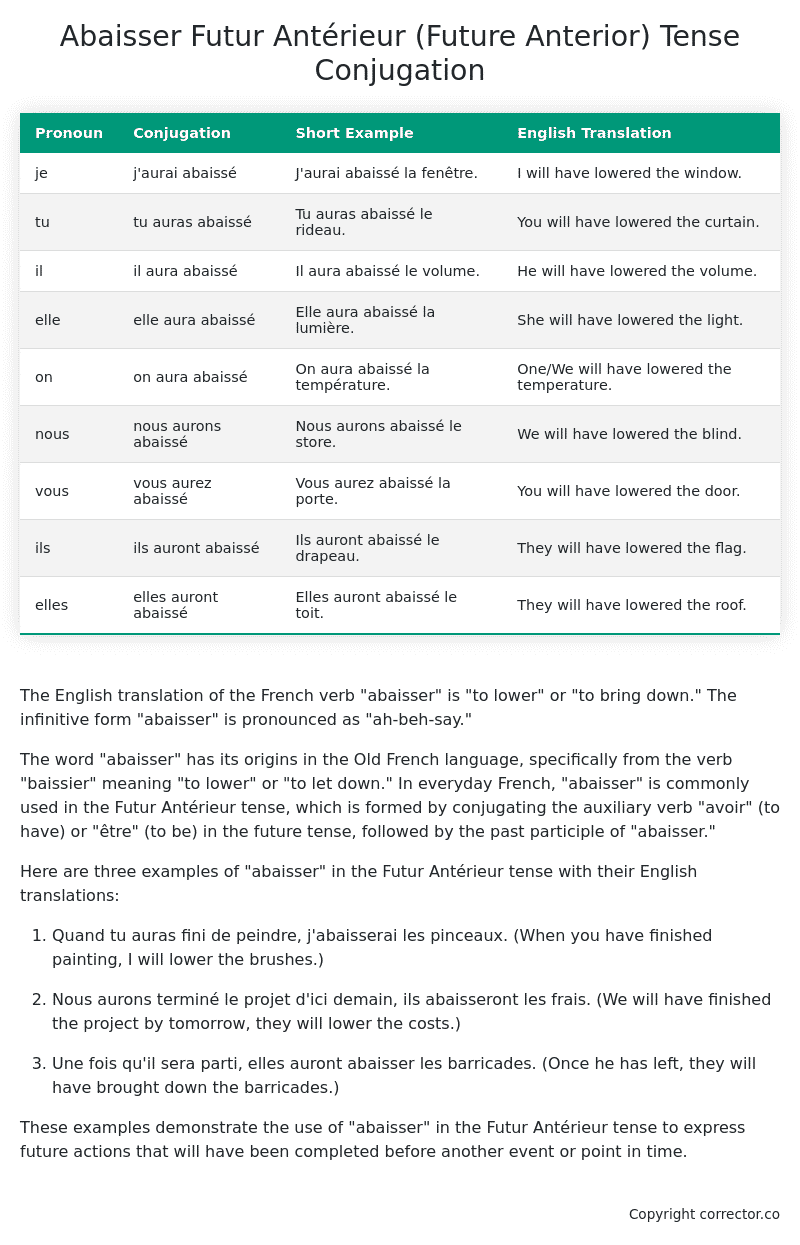Futur Antérieur (Future Anterior) Tense Conjugation of the French Verb abaisser
Introduction to the verb abaisser
The English translation of the French verb “abaisser” is “to lower” or “to bring down.” The infinitive form “abaisser” is pronounced as “ah-beh-say.”
The word “abaisser” has its origins in the Old French language, specifically from the verb “baissier” meaning “to lower” or “to let down.” In everyday French, “abaisser” is commonly used in the Futur Antérieur tense, which is formed by conjugating the auxiliary verb “avoir” (to have) or “être” (to be) in the future tense, followed by the past participle of “abaisser.”
Here are three examples of “abaisser” in the Futur Antérieur tense with their English translations:
- Quand tu auras fini de peindre, j’abaisserai les pinceaux.
(When you have finished painting, I will lower the brushes.) - Nous aurons terminé le projet d’ici demain, ils abaisseront les frais.
(We will have finished the project by tomorrow, they will lower the costs.) - Une fois qu’il sera parti, elles auront abaisser les barricades.
(Once he has left, they will have brought down the barricades.)
These examples demonstrate the use of “abaisser” in the Futur Antérieur tense to express future actions that will have been completed before another event or point in time.
Table of the Futur Antérieur (Future Anterior) Tense Conjugation of abaisser
| Pronoun | Conjugation | Short Example | English Translation |
|---|---|---|---|
| je | j’aurai abaissé | J’aurai abaissé la fenêtre. | I will have lowered the window. |
| tu | tu auras abaissé | Tu auras abaissé le rideau. | You will have lowered the curtain. |
| il | il aura abaissé | Il aura abaissé le volume. | He will have lowered the volume. |
| elle | elle aura abaissé | Elle aura abaissé la lumière. | She will have lowered the light. |
| on | on aura abaissé | On aura abaissé la température. | One/We will have lowered the temperature. |
| nous | nous aurons abaissé | Nous aurons abaissé le store. | We will have lowered the blind. |
| vous | vous aurez abaissé | Vous aurez abaissé la porte. | You will have lowered the door. |
| ils | ils auront abaissé | Ils auront abaissé le drapeau. | They will have lowered the flag. |
| elles | elles auront abaissé | Elles auront abaissé le toit. | They will have lowered the roof. |
Other Conjugations for Abaisser.
Le Present (Present Tense) Conjugation of the French Verb abaisser
Imparfait (Imperfect) Tense Conjugation of the French Verb abaisser
Passé Simple (Simple Past) Tense Conjugation of the French Verb abaisser
Passé Composé (Present Perfect) Tense Conjugation of the French Verb abaisser
Futur Simple (Simple Future) Tense Conjugation of the French Verb abaisser
Futur Proche (Near Future) Tense Conjugation of the French Verb abaisser
Plus-que-parfait (Pluperfect) Tense Conjugation of the French Verb abaisser
Passé Antérieur (Past Anterior) Tense Conjugation of the French Verb abaisser
Futur Antérieur (Future Anterior) Tense Conjugation of the French Verb abaisser (this article)
Subjonctif Présent (Subjunctive Present) Tense Conjugation of the French Verb abaisser
Subjonctif Passé (Subjunctive Past) Tense Conjugation of the French Verb abaisser
Subjonctif Imparfait (Subjunctive Imperfect) Tense Conjugation of the French Verb abaisser
Subjonctif Plus-que-parfait (Subjunctive Pluperfect) Tense Conjugation of the French Verb abaisser
Conditionnel Présent (Conditional Present) Tense Conjugation of the French Verb abaisser
Conditionnel Passé (Conditional Past) Tense Conjugation of the French Verb abaisser
Conditionnel Passé II (Conditional Past II) Tense Conjugation of the French Verb abaisser
L’impératif Présent (Imperative Present) Tense Conjugation of the French Verb abaisser
L’impératif Passé (Imperative Past) Tense Conjugation of the French Verb abaisser
L’infinitif Présent (Infinitive Present) Tense Conjugation of the French Verb abaisser
L’infinitif Passé (Infinitive Past) Tense Conjugation of the French Verb abaisser
Le Participe Présent (Present Participle) Tense Conjugation of the French Verb abaisser
Le Participe Passé (Past Participle) Tense Conjugation of the French Verb abaisser
Struggling with French verbs or the language in general? Why not use our free French Grammar Checker – no registration required!
Get a FREE Download Study Sheet of this Conjugation 🔥
Simply right click the image below, click “save image” and get your free reference for the abaisser Futur Antérieur tense conjugation!

Abaisser – About the French Futur Antérieur (Future Anterior) Tense
Common Everyday Usage Patterns
Interactions with Other Tenses
For example
Summary
I hope you enjoyed this article on the verb abaisser. Still in a learning mood? Check out another TOTALLY random French verb conjugation!


